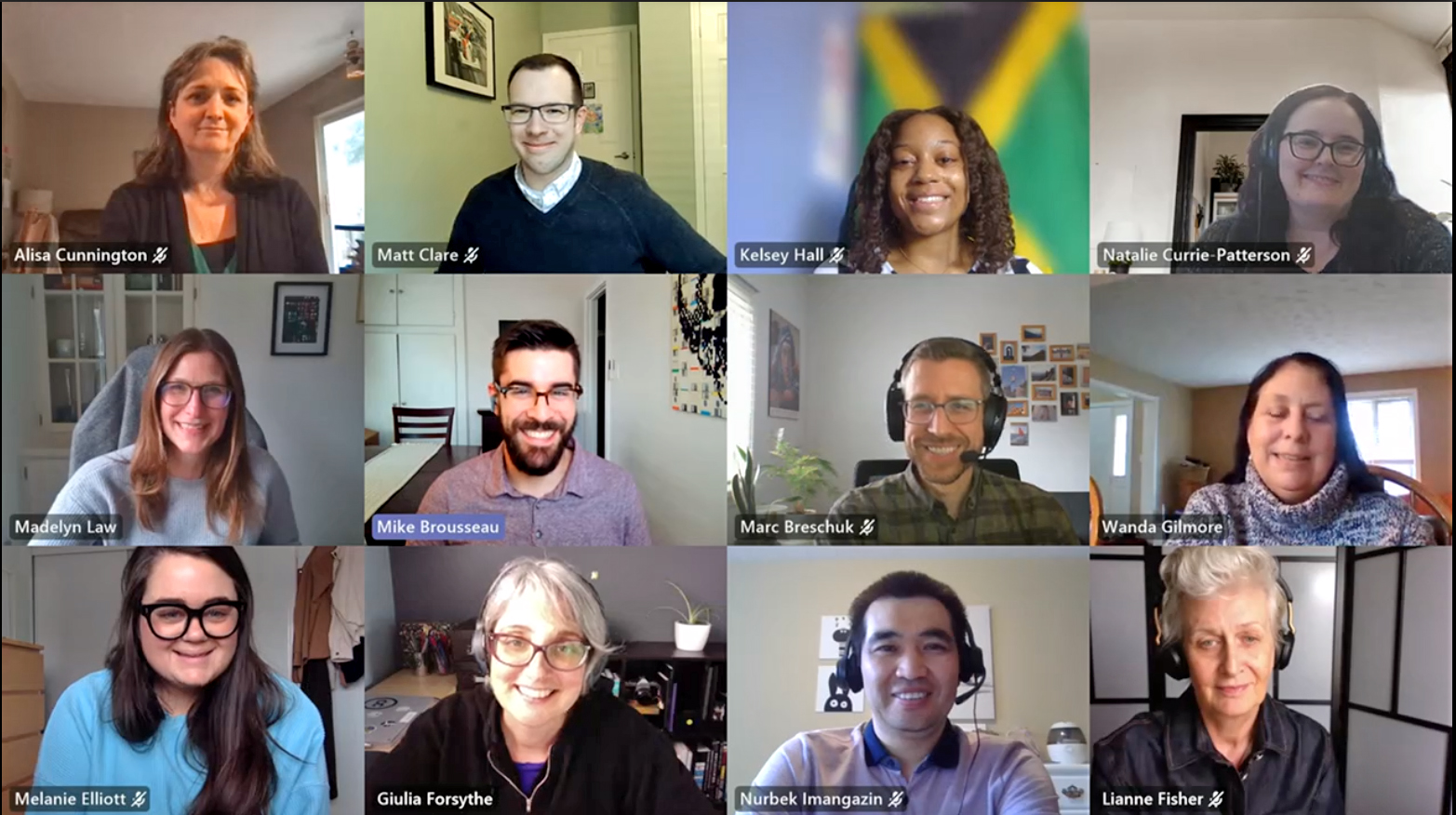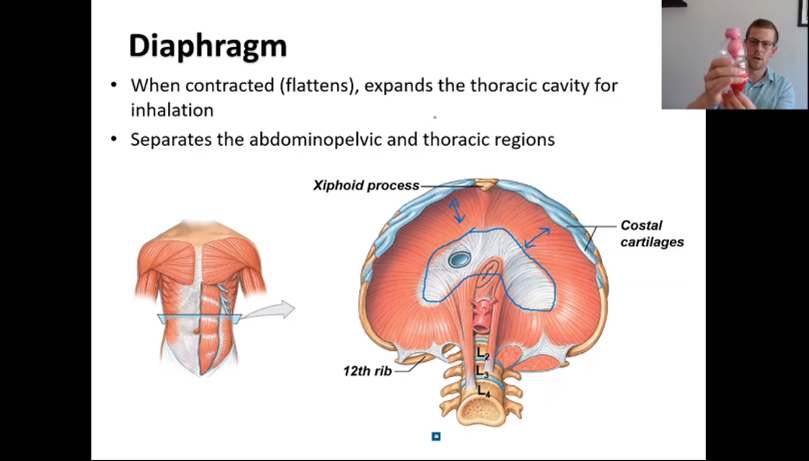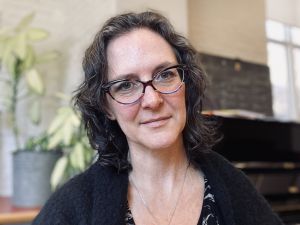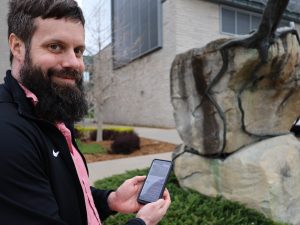 Madelyn Law, Brock’s Associate Vice-Provost, Teaching and Learning (second row, left), and Brock’s Centre for Pedagogical Innovation team worked with instructors throughout the last 12 months to transition courses online during the COVID-19 pandemic.
Madelyn Law, Brock’s Associate Vice-Provost, Teaching and Learning (second row, left), and Brock’s Centre for Pedagogical Innovation team worked with instructors throughout the last 12 months to transition courses online during the COVID-19 pandemic.NOTE: This is one in a series of articles published by The Brock News to mark the one-year anniversary of Brock University suspending in-person, on-campus classes due to the COVID-19 pandemic. To read all of the articles in the series, click here.
“Brock University is suspending in-person classes…”
As Madelyn Law heard the news, the scale of the task at hand became apparent.
On Friday, March 13, 2020, Brock’s Associate Vice-Provost, Teaching and Learning was told the University would be moving all of its courses online as the world was quickly thrust into the new reality of physical distancing to combat the COVID-19 pandemic.
Having been in her senior leadership role for less than a year, Law, who is also an Associate Professor of Health Sciences, knew the challenges faced by her team in Brock’s Centre for Pedagogical Innovation (CPI) and by instructors across the University were critical.
“I thought I would be helping to support Brock’s move to more online teaching innovations over time, but the time for innovation was immediate,” she said. “We didn’t have two years to plan. We needed to have ideas and structures ready to roll out the next day.”
In the hours, days and months that followed, CPI, in collaboration with other units on campus such as Co-op, Career and Experiential Education, the Library and many others, worked with hundreds of instructors and teaching assistants to bring courses online.
“The immediate shift online pushed everyone to rethink and redesign the way they teach,” said Law. “Change is difficult, but if harnessed with good reflection on what works and what doesn’t, it helps us to progress and get better.”
When the migration to online learning was implemented, Assistant Professor of Kinesiology Shawn Beaudette faced a difficult task as he transitioned his Human Anatomy course.
“When teaching in person, we really aim to implement a multi-sensory student learning experience, allowing students to apply what they learn in the lecture in our human anatomy labs,” he said. “Because of these factors, I was apprehensive. I didn’t know what the new change would entail or how long it was going to last.”

Assistant Professor of Kinesiology Shawn Beaudette, who transitioned his Human Anatomy course online, teaches during an online lecture.
After checking in on his students’ well-being and letting them know of the changes to come, Beaudette began bringing his courses online, while also seeking feedback from all involved to continually make his teaching better.
To maintain the feel and cognitive recall an anatomy course demands, Beaudette introduced mid-lecture check-ins that allowed students to show they understood the content of his online lessons as well as a lab that saw students performing 3D virtual dissections in real time through a computer program with their teaching assistants online.
Beaudette said he could not have completed the complex transition on his own.
“As a new faculty member, many of these platforms were unfamiliar to me, so I welcomed any and all suggestions CPI was able to provide,” he said. “In addition to CPI, my students, teaching assistants and colleagues in the Departments of Kinesiology and Health Sciences have been critical to my new approach to online learning. We have worked collaboratively in an attempt to streamline the student experience in our complementary, yet separate, Human Systems Anatomy and Human Musculoskeletal Anatomy courses.”
Though the content being transitioned varied immensely between courses, Law said the central focus for CPI and each instructor her team partnered with was the same.
“Across the University, the core focus has always been students and their well-being,” she said. “Every decision we made considered students’ learning and experience. When we thought about all of the resources we were implementing for faculty, we wanted to learn how they would improve the student experience while ensuring that faculty felt supported.”
Further supports were also given to students when Brock’s Senate approved and extended new options providing students with greater flexibility and choices on how grades are presented on transcripts.
After the shock of spring passed, Law said there was a collective shift in focus.
“Initially, we had a survival approach,” she said. “This thinking shifted with the realization of the need to thrive over the long term. It has not been easy, but it has provided instructors with the chance for some targeted thinking about how they teach.”
Beaudette said he hopes to carry some of the positive changes he has made into his course when in-person learning resumes.
“With the transition to an online world, I’ve come to realize that student lecture-based learning is not a one-size fits all approach,” he said. “Student learning preferences vary, and some have come to appreciate the flexibility that comes with lecture-based learning in an online world. As we approach our ‘new normal,’ I’m expecting that I’ll fall into some kind of hybrid model, with the aim of optimizing the student learning experience for a wide range of learning preferences.”
Law also experienced positives in her own courses she hopes to carry forward.
“I have been able to bring in far more experts to speak to the class online,” she said. “There are certain interesting benefits to online learning we may not have recognized before.”
With an incredible effort from instructors in every Faculty to fine-tune online learning throughout the Fall and Winter Terms, Brock’s Provost and Vice-President, Academic Lynn Wells said it is necessary to recognize the efforts of all involved.
“This has been an unprecedented year of activity at Brock. It has presented all members of our community — students, instructors, librarians and staff — with both personal and academic challenges of historical magnitude,” she said. “Despite this, we have met the situation head-on and persevered. I want to congratulate everyone for their continued dedication to teaching and learning through the academic year.
“We have had to remain flexible and adjust course many times along the way, but through everyone’s hard work, Brock has maintained the high standards for which it is known.”
While reflecting on the perseverance shown by the Brock community, Law was optimistic about the positive changes for teaching and learning methods going forward.
“We will be able to continue many of these amazing gains when we are back on campus as we design new courses and programs linking in great aspects of online learning,” she said. “There’s no denying this has been a difficult time for instructors and students, but their commitment to overcoming these obstacles while finding new ways to teach and learn together will benefit all of us for years to come.”









